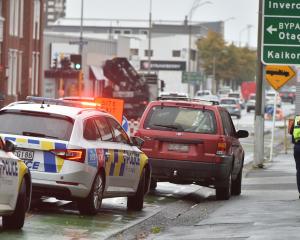
A charitable trust supporting at-risk children in Auckland and Whangarei has praised Dunedin North Intermediate principal Heidi Hayward for her stand over the lack of government funding and resources for at-risk children.
I Have a Dream Charitable Trust chairman Scott Gilmour, of Wanaka, said he shared Ms Hayward’s concerns the new Ministry for Vulnerable Children will not serve children any better than CYF and the Ministry of Social Development has.

The I Have a Dream programme was established in the United States by Eugene Lang in 1981, to help children from low-income communities reach their educational and career goals by providing a long term programme of mentoring, tutoring, and enrichment.
New Zealand was the first country outside the United States to implement the successful programme, and it has been operating in Mt Roskill since 2003.It is now expanding to 1500 disadvantaged youth across four schools in Whangarei, Mr Gilmour said.
"Simply put, our results from the past 14 years of our project in Mt Roskill have demonstrated that investing for an entire generation can solve the problem of inter-generational poverty."
Although numerous Government departments and non-profit organisations were involved at various points in the lives of the children he worked with, Mr Gilmour said all of the interventions were "too short-term or too single-issue focused to be truly effective".
"Similarly, we met the newly formed Ministry of Social Development’s Child’s Action Team in Whangarei in 2015, with the desire to ensure our work collaborated with them, rather than cut across them.
"They were a special team recently formed to identify child and whanau that are at risk of becoming CYF cases.
"What we found is that they were intending to work with 70 families across all of Whangarei."
Mr Gilmour said his programme was working with 1500 children (about 700 families) across four low-decile schools, in just one Whangarei community.
"This is another major concern we have — that the Government’s is targeting just the bottom 1%, whereas recent research shows that 20% of children cause 80% of society’s lifetime social costs."
He said his goal was to prove to the Government that the trust’s model worked, at scale and was cost effective.
"It’s probably going to take us another 5 to 10 years, which is frustrating, but I think we need to get the public demanding change, not just the politicians and bureaucrats talking about it."
He said the next stage was to demonstrate it could be scaled out, cost-effectively, to an entire community.
"We will take the Government with us on this 10 to 15-year journey, with the intention that they will then roll this out to all high needs communities in New Zealand."
Earlier this week, Ministry for Vulnerable Children chief executive Grainne Moss also praised Ms Hayward for sharing her concerns, and has encouraged other principals to do the same.
Mrs Moss said it was important to keep up the dialogue with affected parties.
"I think it’s great that Heidi has highlighted individuals and I would encourage other principals to do the same... because it’s only when we get specifics about individuals and provide individual solutions, that we actually get real sustainable change."
Minister for Children Anne Tolley said the new ministry represented a new way of working for care and protection, as opposed to the present system which reacted in crisis situations.
Under the new system, staff would intervene early, work intensively with families, better support caregivers, and allow young people to stay in care for longer.It would have more specialist staff to address the trauma and complex needs of vulnerable children, she said.












